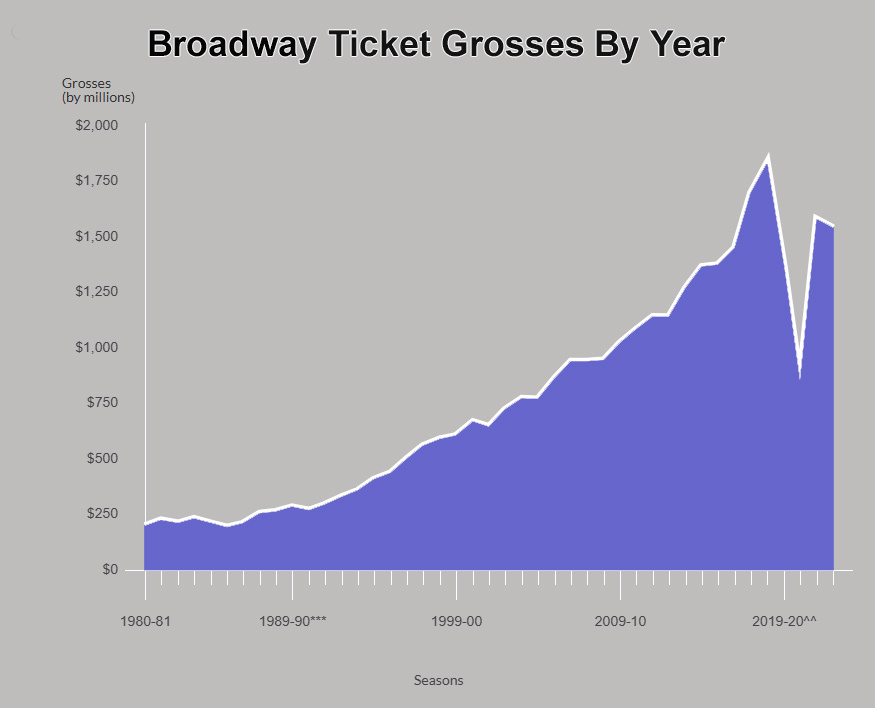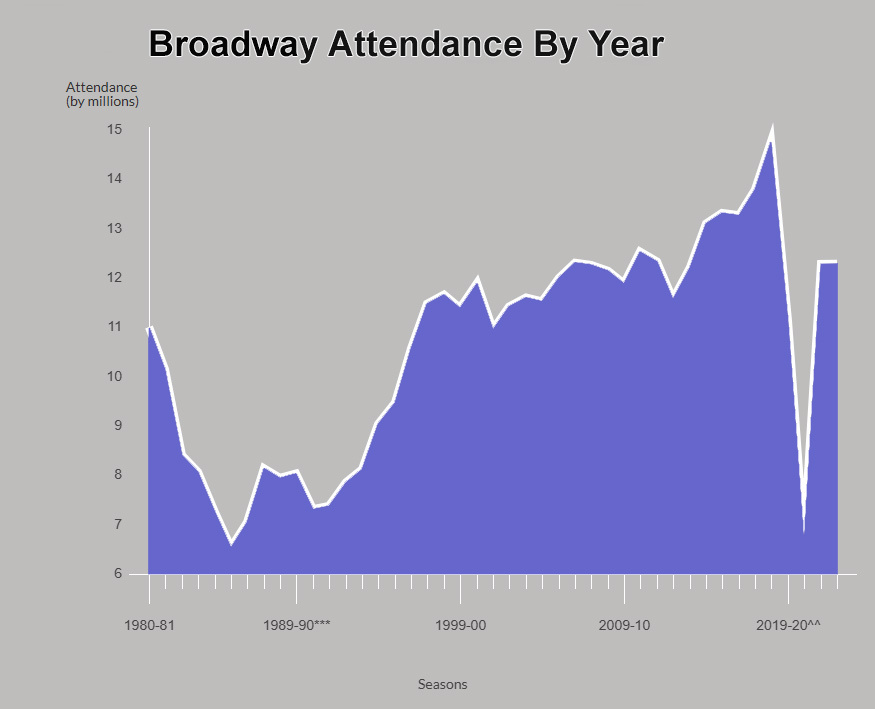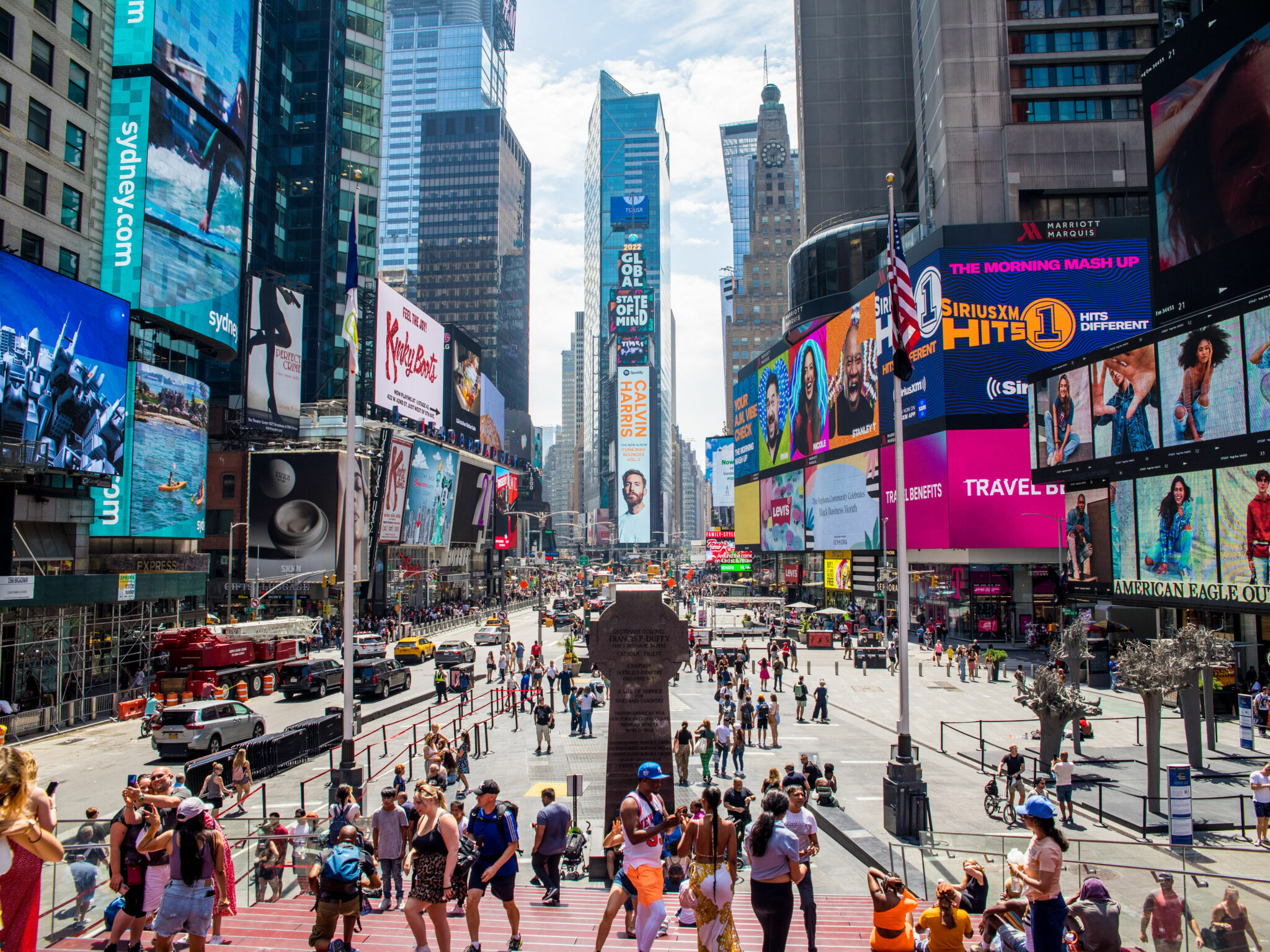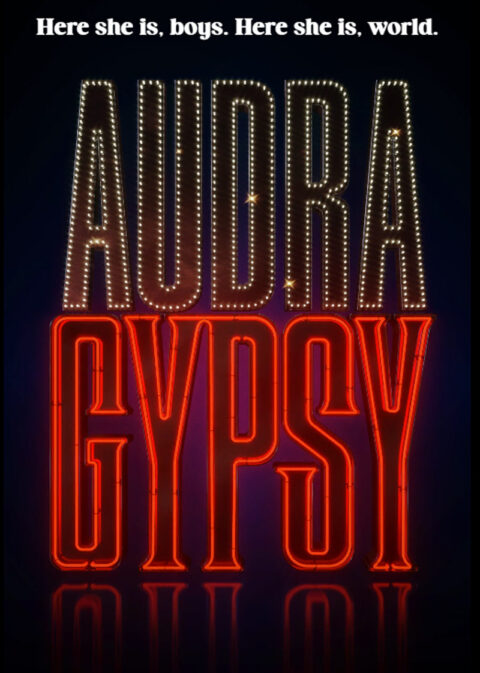Broadway Ticket Annual Grosses Take A Pounding And Drop 10% In Real Terms Compared To Last Year And Over 30% Compared To The 2018/2019 Season
Broadway Ticket Sales Just Took A Nosedive
Given this incredibly vibrant and saturated Broadway show season, with the opening of 21 new plays and musicals before June 2024, it’s very hard to imagine that Broadway actually had a terrible year, financially speaking.
Broadway Ticket Grosses Paint A Dismal Picture
The Broadway season 2023/2024 is the 2nd full season after COVID. During this year there was $1.54 Billion in Broadway ticket sales and 12.3 Million show attendees. The numbers for last year’s season 2022/2023– which was the first full season post-Covid– were $1.57 Billion in ticket sales and the same number of 12.3 Million attendees.
This represents a downturn of about $30 Million (2%) in lost revenue compared to last year, and it's a wash on how many people actually went to see a Broadway show.
Ticket Grosses Comparison to the 2018/2019 Season
Compared to the very last Broadway season before COVID (2018/2019), things are so much worse now. In the 2018/2019 season, Broadway garnered a whopping $1.8 Billion in ticket sales and over 14.8 Million attendees. This past year there has been a significant downturn of $260 Million in grosses (14% decrease) with 2.5 Million less people (17%) attending Broadway shows. The writing on the wall could not be any clearer.

Inflation Rates By Year
- 2023 4.1%
- 2022 8.0 %
- 2021 4.0%
- 2020 1.2%
When Inflation Rates Are Factored In - The Broadway Grosses Trend Paints A Dismal Picture
When inflation is factored into the Broadway grosses, this year's numbers look even worse. The data shows that, in real Dollar value terms, Broadway ticket revenue is effectively down 10% from last year. Its down a whopping 30% when compared to the 2018/2019 season.
Broadway Attendance Is Not Rising
It's safe to say that Broadway attendance had been increasing every year since 2012, reaching a crescendo pre-COVID of 14.8 Million attendees in the 2018/2019 season. Obviously the COVID years cannot be fairly counted, but since COVID has ended, the numbers for the last two years have been flat at 12.3 Million attendees and they don't seem to be going up. Broadway is not finding new audiences.

The Broadway League Is Trying To Play Down Losses
According to the Broadway League data, the ticket grosses this year that yielded $1.54 billion and total attendance of 12.3 million, were within estimates. While those numbers may seem high, in reality, they are much more reflective of the 2013-2014 season, which was a whole decade ago.
In the Broadway League’s press release, interim president Jason Laks tried to sugar coat the less-than-sterling numbers. He called the year “wonderful” and claimed that audience response is high. He elaborated on Broadway’s dynamic, inclusive space which empowers artists to explore diverse narratives. According to Laks, there’s something for everyone.
Lak’s statement may be artistically correct, but the financial numbers don't lie - Broadway ticket sales just took a pounding and their strategy to bring in new audiences has failed.
The Top Reasons For The Bad Broadway Ticket Sales In The Past Season
COVID
It would be easy to blame post-Covid doldrums for the downturn on Broadway, but ticket sales have kept going up and up since COVID ended. People had been cooped up for far too long and when they found a new lease on life post-pandemic, they began by seeing a lot more Broadway shows. Those distant days of lock-down are now just a painful memory, but could the pandemics effect still be felt on Broadway? Could the initial post-COVID splurge be a poor indicator of things to come for the Great White Way?
Street Violence and Protests
Ongoing street violence and protests are keeping away tourists from New York City. The New York City subway is regularly experiencing some horrific crimes and the streets of the NYC boroughs are not perceived to be safe. The New York City Council and the mayor are not providing any viable solutions and out-of-towners see the awful news stories every night.
Many Long-Term City Dwellers Have Already Left Town
It’s clear that so many New York City residents have moved out of town and they have been replaced with younger, more affluent residents, who work longer hours and drive up housing rents to astronomical amounts. This new group may not have the time (or inclination) that the previous demographic group had to see a Broadway show. According to the Broadway League, the average age of the Broadway theatregoer is now 40.4 years old, which is the youngest number its ever been, and represents a dramatic shift in the Broadway show attendee demographic.
Suburbanites Getting Ready For Congestion Pricing
Out-of-towners are going to be hit with so-called “congestion pricing” at some point, when they decide to drive into NYC to see a Broadway show. It may well be that they are getting used to a new-normal of not going into NYC at all. With bridge and tunnel charges, parking fees and now the congestion charge all out of control - it may have become just all too much, financially speaking.
NY State Governor Kathy Hochul, has given congestion pricing a pause for now, but it appears that she will buckle to the political pressure post November 2024 elections. In addition, The Broadway League and the New York City Tourism + Convention organization failed to get a time carve-out from the MTA for Broadway attendees coming into town to see a Broadway show and not having to pay the congestion charge.
Ticket Prices Are Very High
For the top Broadway shows, ticket prices are often high, but recently the top Broadway shows have increased their ticket prices to some astronomical amounts. One of the top shows, Merrily We Roll Along raised its base orchestra ticket price to $700, which is far beyond most people's budget. For a populist art-form trying to reach the masses, Broadway is failing hard. Its fast becoming an elitist pursuit again.
The Anti-Discounting Strategy Has Failed Dismally
The Shubert Organization and The Broadway League have made no secret of their attempts to stop shows from discounting their tickets this past year. Their argument has been that it drives averages lower and creates a “race to the bottom” on ticket pricing. The year’s terrible financial results shows that there’s more than one way to hit rock bottom and their strategy may demonstrate that the free-market should remain just that, free. If shows want to discount their tickets, they should let them and stop putting their idle finger on the scale.
Less Tourists Because There Are Less Hotels
New York has received so many asylum seekers that many NYC hotels are now housing them instead of tourists. The New York Times reports that 135 of the 680 hotels scattered across NYC entered the lucrative immigration program that allows migrants to be housed in NYC hotels and the costs are being paid by the city.
This means fewer beds are available to tourists. Hotels are making much more money through the process of housing migrants than they ever make from tourists, so there is little motivation for NYC hotels to house tourists. This means less tourists in town, because there are less beds - and the ones that are available are more expensive, as their is far less supply.
Airbnb Ban Deters Tourists
NYC's Airbnb ban that went live in 2022 (but was only being enforced in 2023) may ease housing markets for locals, but it does nothing for large vacationing families that would have come into the city, rented a large condo and bought lots of Broadway tickets. These are customers that could never afford to house themselves in NYC hotels, and given that hotels are now even less available due to the migrant crisis, New York City may now experience a tourist crisis as well, where visitor numbers go down to all-time lows as they have nowhere to stay.

With Broadway Ticket Prices So High Now, How Can This Year's Ticket Grosses Be So Down?
On Broadway there are at least 18 shows that make over $1 million dollars in revenue from ticket sales per week. Quite often five Broadway shows will break $2 million dollars in revenue per week. With these kinds of numbers how can the total Broadway revenue at large be so low?
While some long-running shows have ticket discounts available, even for those not exclusively in the know, some of the newer, starrier vehicles still insist on charging dearly for a coveted experience. For example, the current revival of Cabaret starring Eddie Redmayne and Gayle Rankin (who are not by any stretch household names) will set the average theatre-goer back approximately $250 per ticket to sit in the back of the mezzanine on a Tuesday evening.
Orchestra seats for the acclaimed revival of Merrily We Roll Along (starring Jonathan Groff and Daniel Radcliffe) start at over $400 for a similar weeknight performance, but balloon to $700 for better seats. And that is just face value, forget the insane numbers that ticket brokers are charging.
No ticket discounts can be found unless you want to settle for an understudy for any big show. By making these events out of reach for the middle class, those of lower socioeconomic status and young folks, Broadway continues to perpetuate its longstanding reputation of being an elitist culture.
Broadway Show Operational Costs Increases
With the significant decrease in revenue from Broadway ticket sales, it also doesn't help that operational costs have increased as well, meaning now there is even less profit on Broadway.
This change may explain why so few Broadway shows now announce that they recouped their initial investment. It seems Broadway– a risky venture to begin with– is becoming riskier by the day.
So what operational costs have significantly increased for shows? Actors want more money, theatre landlords have put up their prices, unions have demanded more money, safety protocols have increased costs and even delayed (or canceled) shows. Its now a money pit for investors that so rarely turns a profit.
Broadway Fans Try To Find Ticket Discounts
Anyone who has designs on attending a Broadway show knows that tickets are likely to cost a pretty penny.
Naturally, locals are hip to discounts, lotteries, and rush policies, but the tourist crowd usually purchases their tickets from afar and in advance. They also don’t have date flexibility. For that major audience demographic, a night at the theatre is now prohibitively expensive.
So, if prices for shows like Cabaret and Merrily We Roll Along are astronomical, why do the receipts tell a different story? Well, people are just not willing to fork over the dough in big enough numbers, and the shows often have empty unsold seats.
How Did The Anti-Discount Ticket Strategy Fail?
Charles Flateman, the Executive Vice President at the Shubert Organization (Broadway’s largest landlord), has long since hated the discount Broadway ticket model. His ideas to limit them were tested this last year, which led to a significant decrease in discount Broadway ticket offers and this then resulted in one of Broadway’s worst years in recent history. Its not too hard to connect the dots.
What Flateman and his cohorts failed to grasp is that by discounting some Broadway shows, it drives the overall market of the budget-conscious ticket buyers. These ticket buyers won’t see a Broadway show unless they get a good price on tickets. When Broadway show producers have large amounts of unsold ticket inventory left at the end of the day, then they have failed in their fiscal responsibility to show investors they can deliver.
New Ticket-Sales Strategy Fails
The new strategy on Broadway this past year has been to decrease discount offers to locals and beef up discount ticket sales at the TKTS booth in Times Square - but this only rewards tourists, who may have likely paid full price for tickets in the first place. It is the locals and the suburbanites that keep Broadway alive and Charles Flateman has seemed to forget that when he cut down discount offers for the masses.
Flateman is also the chairman of the Board at the New York City Tourism + Convention, which is the official tourism organization for the five boroughs of NYC. Under that role Flateman failed to get a carve-out from the MTA on congestion pricing for Broadway show attendees, which is expected to reduce suburbanite traffic to Broadway shows even further. Flateman has a huge pull with NYC hotels, but 135 of them still ditched tourists for the more lucrative asylum seekers, and helped Broadway into this mess.
In this whirlwind of a bad financial year on Broadway, it appears that Flateman is in the eye of the storm directing traffic into the abyss.


